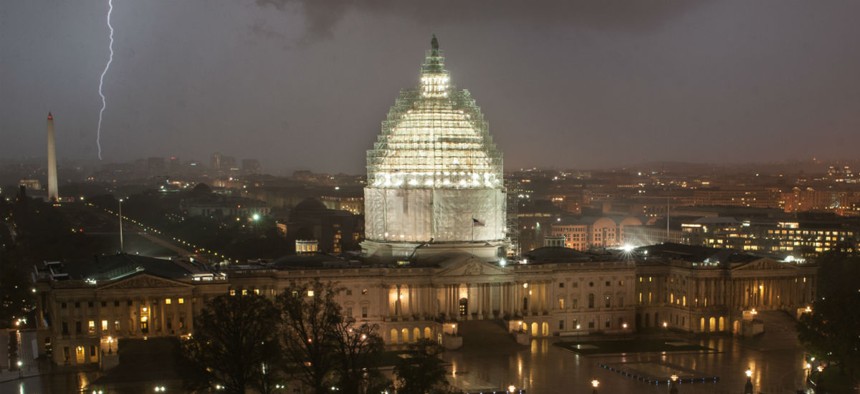
Architect of the Capitol
The Next Budget Conflict Has Begun, With a Potential Shutdown on the Line
The dispute over defense versus domestic spending means bills will pile up until September. What happens then?
The message from Senate Democrats this week will go like this: Serious talks should begin now on avoiding a government shutdown. Why force us to carry out our threat of blocking all spending bills until we hit September, the last few days of the fiscal year, to come up with a panicked back-against-the-wall solution? We all know that's where we're heading.
Lawmakers from both parties admit they haven't gotten past the posturing part of this battle to a point where they can sit down and actually negotiate. People in both the Republican and Democratic caucuses are hoping for a budget compromise like the one struck by Rep. Paul Ryan and Sen. Patty Murray two years ago, but there has not yet been a whisper of even an introductory meeting to start such a bargaining session.
In the meantime, the Senate will spend this week debating the finer points of a crucial defense authorization bill that might already be a dead horse. It is expected to pass the Senate, perhaps by the end of the week. But it will have to be reconciled with a House version, and the White House has threatened to veto the final bill if it includes a funding "gimmick" to meet its own request of some $612 billion for the Defense Department.
Before final passage in the Senate, Democrats will make the case that mandatory budget caps put in place more than three years ago are damaging to U.S. troops and the country's national security. They will ask that the measure's $40 billion in off-budget contingency war funds be walled off until a similar amount of money is made available for nondefense agencies like the Veterans Affairs Department or the Centers for Disease Control and Prevention.
Sen. Jack Reed, the top Democrat on the Armed Services Committee, sponsors the amendment that would unravel the "escape route" from budget caps that GOP hawks have used to backfill the required cuts to the military. He argues that other agencies, including the Department of Homeland Security and the National Institutes of Health, are just as critical to national security as the Defense Department. "What about the Centers for Disease Control? How do we help protect Americans from things like Ebola?" he queried last week.
Democrats view the debate on Reed's amendment as the beginning of a summer-long conversation about the proper way to fund national security and the country's other priorities. They will point out, for example, that the contingency war fund stops DOD from long-term planning on weapons systems because it has to be re-upped every year.
On that point, Republican hawks agree. Armed Services Chairman John McCain says he hates using the contingency war funds to keep the Pentagon afloat, but he has no choice given the constraints of the budget rules. The other option—to cut money from the military—is unacceptable.
"I've got to play the hand I'm dealt," McCain said in a recent interview. "I'm not going to go along with something that puts the lives of men and women at greater risk. I have an obligation to them."
But Republicans' sympathy for Democrats' complaints is generally limited to those defense-related items. GOP lawmakers view Democrats' demands for equal money for domestic programs as careless and unnecessary. "You have an emergency problem at home. You've got to fix the roof. A tree fell through it. You don't increase your vacation spending," said Sen. Jeff Sessions, a senior member of the Armed Services Committee and a supporter of the mandatory budget cuts.
Sessions said the global crises since the 2011 Budget Control Act—in Syria, Lebanon, Iraq, and Crimea, to name a few—necessitate new emergency spending for defense. But, he added, that shouldn't mean nondefense spending has to occur at the same rate.
And Republicans have already seized on Democrats' vow to block all appropriations bills until the defense vs. domestic spending issue is resolved. "Democrats are trying to extract more funding for the IRS and the [Environmental Protection Agency]," House Speaker John Boehner's office blogged Friday. "And if they don't get it, they're going to hold the budget hostage, and shut down the federal government."
If Democrats' demands are viewed as a simple opening bid in an unfinished negotiation about how taxpayer dollars are spent, then they have succeeded in the first part of their goal—starting the conversation. When Republicans can accurately reiterate their demands in public, if only to shoot them down, they know their arguments have landed.
Democratic leaders last week granted McCain his request that the brewing spending fight not take place on the back of the defense authorization bill. Democratic aides said Senate leaders will not pressure their caucus to vote against it.
But that accession comes with a warning: The vote on Reed's spending amendment is only the beginning. Without an accord on spending, the fight about supplying the troops will get uglier, with a potential government shutdown on the line. The only question is whether lawmakers grapple with it now or in the fall.
NEXT STORY: Play of the Day: Rick Perry's Résumé






